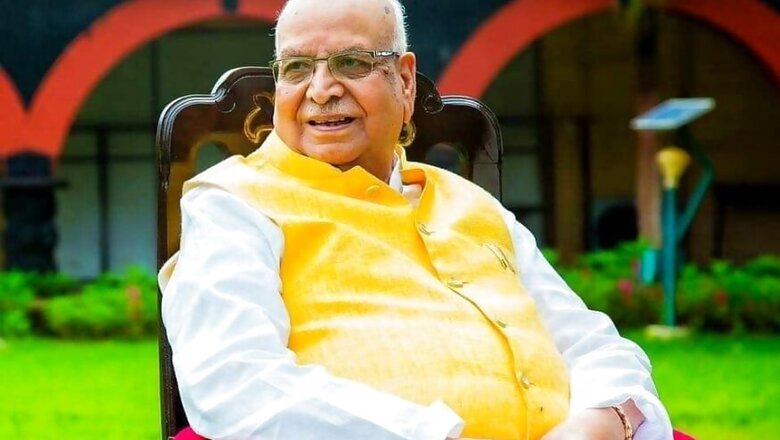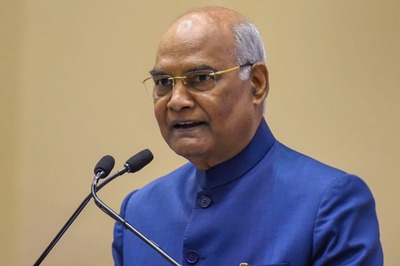
views
Madhya Pradesh Governor Lalji Tandon breathed his last on Tuesday morning after a month-long struggle against acute illness, comprising multiple organ failures, at a super specialty hospital in Lucknow. He was 85. The veteran of Indian politics will, however, be remembered for long because of his good nature and social and political outreach that was never curtailed by his political ideology.
A true embodiment of the “Atal school of politics”, Tandon -- referred to as "Babu ji" by his admirers -- will be remembered as a man who despite being a die-hard saffron soldier excelled at the art of political navigation in such a manner that his moves against rivals were never ugly. He was one among that fast-thinning breed of politicians who had good personal relations across the political spectrum; case in point being his relationship with BSP supremo Mayawati who tied a 'rakhi' to him every year.
In early March this year, it was his last interaction with a few journalists in Lucknow. Tandon was back home in the old city area of Chowk in Lucknow for Holi celebrations, a tradition he had never missed. While he was at home, Madhya Pradesh was hit by political crisis as the then Kamal Nath government came under a storm after rebellion from Jyotiraditya Scindia. As journalists scrambled to get Tandon's take as the governor on the erupting crisis, they were only met with delicious ‘Gujhiyas’ and a smile.
This was the style Tandon professed. Clearly, he was not a man in hurry, despite the fact that beleaguered Madhya Pradesh chief minister Kamal Nath had already sent him a letter, requesting immediate sacking of six of his cabinet colleagues
This was the kind of political functioning that Tandon has mastered over the decades. In local parlance, it’s the typical Lucknowi-style of moving unhurriedly, chewing something fine before swallowing it.
Born and brought up in Lucknow, Tandon got associated with the Rashtriya Swayamsevak Sangh (RSS) and erstwhile Jan Sangh when he was young. However, his links with saffron politics never limited his outreach and connections with people from different sections of society.
Having started as a corporator in early 1970s, Tandon entered the upper house of the UP legislature a decade later. However, his meteoric rise within the BJP and saffron politics came with Atal Bihari Vajpayee’s entry in the electoral race from the constituency of Lucknow in 1991.
Tandon became the election manager for the BJP stalwart. His political connect across the social spectrum came as added advantage in the constituency which did not just have a sizeable Muslim population but also had a very distinct secular character. Since then, he never looked back.
Having seen and reported for long on Tandon, senior journalist Brijesh Shukla says, “There was a clear imprint of the "Tehzeeb" amidst which he had grown up. He reflected the spirit of Lucknow, the city known for mutual co-existence and reverence for different religions and ideologies."
As his personal bonding grew with Vajpayee, Tandon steadily climbed up the ladder within the BJP. He was appointed the urban development minister in the first BJP government in UP, with Kalyan Singh as chief minister in 1991. Those were also the hay days of the temple movement, but very much like his political mentor, Tandon too remained a soft face of Hindutva, never venturing out on the frontlines of the Ram Janmabhoomi agitation.
For Tandon, loyalty to his political mentor was supreme. Post mid-nineties as BJP's pioneer of temple movement and former chief minister Kalyan Singh got into an inner party struggle with top leadership, specially Vajpaee, Tandon firmly stood with the Atal camp.
Later on, Tandon, along with former UP CM and emerging face of the BJP in Uttar Pradesh Rajnath Singh and Kalraj Mishra, became the most established troika of the BJP in the state. As Vajpayee led the country as PM from 1999 to 2004, Tandon continued to be his key man in Lucknow.
This unshaken commitment gradually earned him the title of political heir to Atal Bihari Vajpayee, when it came to his constituency of Lucknow. As Vajpayee gradually withdrew from the political arena because of ill health, Tandon was the natural choice for replacing him as the BJP candidate from Lucknow in the 2009 parliamentary elections. He was elected to the 15th Lok Sabha by a margin of over 40,000 votes over Rita Bahuguna Joshi of the Congress.
In 2014, as he was denied a poll ticket and was forced to pave the way for Rajnath Singh as a candidate from Lucknow, many thought it was the end of the political journey for Tandon. A man well versed in the “Atal school of politics” was considered to have lost in the era of Narendra Modi and Amit Shah.
However, Tandon’s old-school practice of patience and buying time in politics didn’t go in vain. As former BBC correspondent Ram Dutt Tripathi says, “Lucknow is known for the culture of ‘pehle aap (after you)’. Tandon has mastered it in his political discourse. So, even when it comes to fighting the odds, he refrains from being the one to deliver the first blow.”
This style of politics slowly brought the focus back on to him, as he got the governorship of Bihar in August 2018 and was then shifted to Madhya Pradesh in 2019, the office he was currently holding.
News of Tandon's demise on Tuesday morning was shared on Twitter by his son Ashutosh, a cabinet minister in Uttar Pradesh's Yogi Aditananth government. A one-line message "Babuji nahi rahe” was enough to let all know it was the end of Tandon’s worldly journey.




















Comments
0 comment